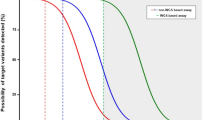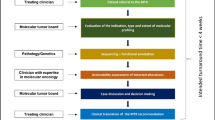Summary
Approximately 20% of locoregional colorectal carcinoma (CRC) relapse after standard of care treatment. Therefore, it is necessary to personalize our adjuvant strategies and define this subgroup, which remains at high risk after treatment. Circulating tumour DNA (ctDNA) is cell-free DNA from apoptotic cancer cells, which carries the whole genome information of the primary tumour and has emerged as good candidate to guide our therapy decisions in the future. It was shown that high levels of ctDNA after adjuvant chemotherapy is a poor prognostic factor. Moreover, it was presented at ESMO 2019 in Barcelona that patients with advanced colorectal carcinomas and ctDNA-positive samples after surgery had a significantly decreased 2‑year disease-free survival in comparison to ctDNA-negative patients. That means, ctDNA could be a tool to select this high-risk subgroup in advanced CRC in order to prolong or intensify adjuvant chemotherapy and to avoid insufficient treatment.
Similar content being viewed by others
References
Rawla P, Sunkara T, Barsouk A. Epidemiology of colorectal cancer: incidence, mortality, survival, and risk factors. Prz Gastroenterol. 2019;14(2):89–103.
Gray R, Barnwell J, McConkey C, et al. Adjuvant chemotherapy versus observation in patients with colorectal cancer: a randomised study. Lancet. 2007;370:2020–9.
Andre T, Boni C, Navarro M, et al. Improved overall survival with oxaliplatin, fluorouracil, and leucovorin as adjuvant treatment in stage II or III colon cancer in the MOSAIC trial. J Clin Oncol. 2009;27:3109–16.
Cheng F, Su L, Qian C. Circulating tumor DNA: a promising biomarker in the liquid biopsy of cancer. Oncotarget. 2016;7:48832–41.
Murtaza M, Dawson SJ, Pogrebniak K, et al. Multifocal clonal evolution characterized using circulating tumour DNA in a case of metastatic breast cancer. Nat Commun. 2015;6:8760.
Wong SQ, Raleigh JM, Callahanet J, et al. Circulating tumor DNA analysis and functional imaging provide complementary approaches for comprehensive disease monitoring in metastatic melanoma. JCO Precis Oncol. 2017;1:1–14.
Yao J, Zang W, Ge Y, et al. RAS/BRAF circulating tumor DNA mutations as a predictor of response to first-line chemotherapy in metastatic colorectal cancer patients. Can J Gastroenterol Hepatol. 2018; https://doi.org/10.1155/2018/4248971.
Bachet JB, Bouché O, Taieb J, et al. RAS mutation analysis in circulating tumor DNA from patients with metastatic colorectal cancer: the AGEO RASANC prospective multicenter study. Ann Oncol. 2018;29(5):1211–9.
Tsao SC, Weiss J, Hudson C, et al. Monitoring response to therapy in melanoma by quantifying circulating tumourDNA with droplet digital PCR for BRAF and NRAS mutations. Sci Rep. 2015;5:11198.
Li M, Chen WD, Papadopoulos N, et al. Sensitive digital quantification of DNA methylation in clinical samples. Nat Biotechnol. 2009;27:858–63.
Garrigou S, Perkins G, Garlan F, et al. A study of Hypermethylated circulating tumor DNA as a universal colorectal cancer biomarker. Clin Chem. 2016;62:1129–39.
Tie J, Cohen JD, Wang Y, et al. Circulating tumor DNA analyses as markers of recurrence risk and benefit of adjuvant therapy for stage III colon cancer. JAMA Oncol. 2019; https://doi.org/10.1001/jamaoncol.2019.3616.
Taieb J, Taly V, Vernerey D, et al. Analysis of circulating tumor DNA (ctDNA) from patients enrolled in the IDEA-FRANCE phase III trial: prognostic and predictive value for adjuvant treatment duration. Annals of Oncology. 2019;30(5):v867.
Author information
Authors and Affiliations
Corresponding author
Ethics declarations
Conflict of interest
A. Reichinger and H. Rumpold declare that they have no competing interests.
Additional information
Publisher’s Note
Springer Nature remains neutral with regard to jurisdictional claims in published maps and institutional affiliations.
Rights and permissions
About this article
Cite this article
Reichinger, A., Rumpold, H. Circulating tumour DNA-guided adjuvant chemotherapy in colorectal carcinoma. memo 13, 334–336 (2020). https://doi.org/10.1007/s12254-020-00607-y
Received:
Accepted:
Published:
Issue Date:
DOI: https://doi.org/10.1007/s12254-020-00607-y




